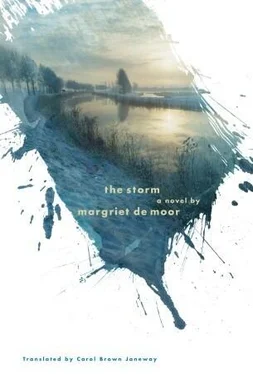The snow was getting thicker. Five or six minutes had gone by since the small community in the attic had broken up. Even had Lidy wanted to, which was not the case, she would no longer have been able to see how her former companions were faring on the other raft. There were only two of them. Only Laurina and Nico van de Velde had been able to keep their grip on the other part of the floor, from which planks had started immediately to break off left and right. Now they were caught in an undertow, the raft tipped; they managed to pull themselves back up on it and stretch out on the wood before they disappeared forever into the driving snow with no one to witness them.
It was slowly getting too dark for anything to be visible, and moreover the screaming and howling of the hurricane discouraged any observation of their wider surroundings. In such conditions, what would be the point of trying to see anyway? Lidy kneeled there, hunched over, legs spread for balance, in the borrowed thick coat that was soaked through, and rough shoes, and clung to a plank that protruded a little above the others. What you see in such a position is mostly your hands. But her very blindness, or close to it, served only to sharpen her other senses. Some living force was coming at her, constantly shape-shifting, in curves, and wings, and foam, and spray: it was the question that silenced all life’s other questions. Almighty God, merciful God …
Did she really still believe she could manage? Or was she sensing the road now opening to her at such speed? It doesn’t matter. Ignoring everything a rational person knows in principle, she held fast with all the skill she could muster, as if someone had just taught her the lesson of a lifetime. She knew her fingers had become very bony. A few minutes before, she’d seen that she’d lost her ring, her wedding ring with the little ruby. And she had actually thought, Oh, what a pity!
On February 1, European time, at 5 degrees latitude, the sun goes down at 17:27. And now she really couldn’t see her hand in front of her eyes. The cloud layer was so thick that even the moon couldn’t penetrate it.
Exactly a week after her father died, and three days after his funeral, Armanda awakened with the uncontrollable urge to tell anyone and everyone that her father had died not once but twice. It was a particularly beautiful autumn day, sunny, with a hint of sweetness in the misty air. An hour later, when she stood in the street and saw the men and women coming out of their houses to head for work — on bicycles, on foot, or, some of them, by car — she wasn’t sure whom to impose her urge on first. Everyone seemed absorbed in their own thoughts, and she wasn’t accustomed to striking up conversations with just anyone. The first time her father had died was over a year ago. A malignant tumor on the pancreas, a seven-hour operation, a partial recovery, but like everyone he had understood and accepted that the only use of his recovery was, quite properly, to hold his wife, his children, and his grandchildren close and take his leave of life. Emaciated, gentle to the point of formality, he lay on his deathbed, prayed with the minister, looked deeply into the eyes of each of his loved ones, thanked Nadine with “you were my whole world,” closed his eyes for three days, his pulse meantime almost imperceptible, and opened them again on day four. Blue, clear, focused.
Restless and impatient, she walked toward the Rijksmuseum, with a white cloud standing above it. The sunny city felt cold and unwelcoming. Looking around her, she wondered which of all these faces could be the one to talk to. Her father had died again the week before, swollen and struggling. He didn’t want to go. And went when no one was there with him. She came to the underpass to the museum. Even before she entered it, she was assaulted by the sounds of the accordion player performing sentimental German pop songs. As she paused under the domed ceiling, the volume was overwhelming. She stood still, glanced around, and listened to the song. She was forty-nine years old, had renounced more than a few desires and suppressed others, as who hadn’t in this phase of their lives — but this one?
There must be some important exhibition, she thought. On the other side of the building, in front of the entrance, was a rather disheartening queue of people. She joined it next to a tanned, quite young guy with long blond hair and muscled arms, in a T-shirt, a sort of Viking type, and said to him: “Oh, oh, this is going to take a while, isn’t it!” After some desultory chitchat, she got onto the subject of the double death of her father, Jan Brouwer, seventy-six the second time around.
“Not a bad age,” said the Viking. They hadn’t advanced a single step.
“Maybe not,” she said, “and yet deep in my heart I count it as seventy-five for the first of his lives, and a year for the other.”
The Viking looked at her eagerly.
“Well,” she said. “Can you imagine it? Completely changed.”
“How — changed?”
In a tone that suggested she was having to explain the obvious, she said: “I mean that my father, a retired cardiologist, was a highly intelligent, rational, devoted man, focused on his work and his family. There’s a certain kind of person who’s born to live a happy life.”
“True.”
“So, after his first death, his character, his behavior, even his appearance, changed completely. I mean, he even started tying his shoelaces differently, making two bows first and only knotting them afterward.”
The Viking stared at her for a moment. Then made a face, a sort of grin of recognition.
With a hand shielding her eyes like a bridge, for the sun was climbing in the east, she said: “Father began to eat. After two months he was a little, fat old gentleman, still very friendly, but friendly in a different way, restless, and his face got redder and he wore these funny checked shirts. And he started taking walks all on his own for hours at a time, and when he came home he wouldn’t say a word about them to my mother. If he’d been younger, you could have imagined — well, you know. Once …”
Suddenly the queue was moving. That always makes everyone start itching to cover the full distance right away. Conversations cease.
“Once,” Armanda finished her sentence, “I see him in the city, he’s walking ahead of me, quite fast, given the way he is, for Father was always someone who would step aside politely rather than get into a showdown about who-has-the-right-of-way-on-this-sidewalk, but now he’s making a path for himself across the Vijzelgracht by dint of staring grimly straight ahead, or so I guess, and he comes to the Rokin, then the dam, then he goes all the way down the Damrak as far as the main station, which he goes into by the front entrance, then out again on the other side, and then on the Ruijterkade, quite by chance, as far as I can tell, he meets a big, untidy-looking woman, who speaks to him, to Father’s initial embarrassment, I think, but then it’s as if she’s given him a password, she suddenly gets this really friendly smile out of him and they have a cheery conversation for a good ten minutes. So, after they shake hands and say good-bye, part of me wants to catch up with him and say, Hello, Father! but another part of me is inclined, given how arbitrary the whole story seems, to just watch where this suddenly new and resurrected father of mine goes on these private walks of his, so I follow him and see him, a minute later, pushing open the door—”
She had reached the ticket desk. The girl looked up. Armanda said over her left shoulder, searching for the Viking, who was nowhere to be seen: “—to the tavern, the one on the corner, you know, it’s all done up to look old, and they still scatter sand on the floor.”
Читать дальше












